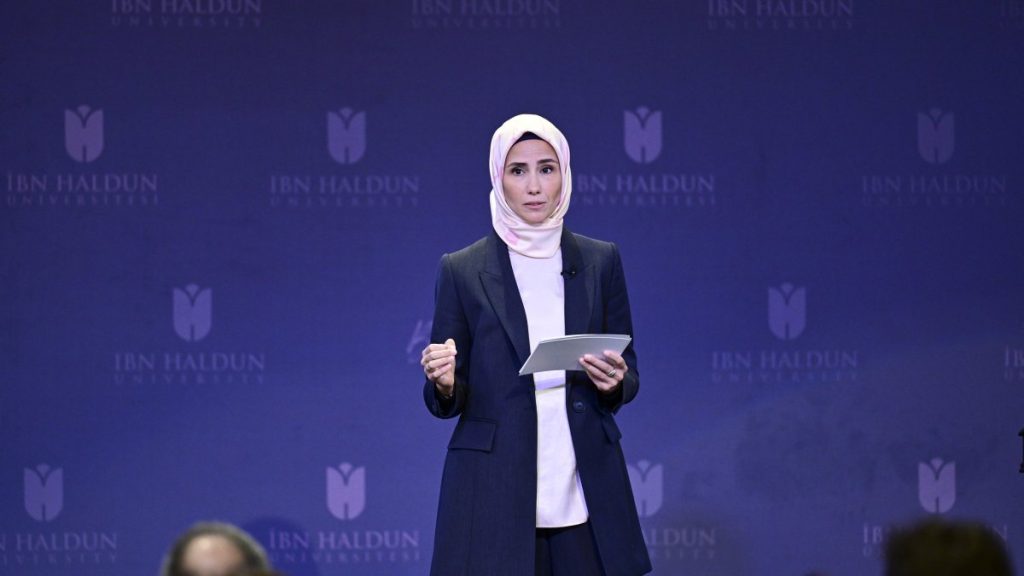Sümeyye Erdoğan Bayraktar, Chairwoman of the Board of Trustees of the Women and Democracy Foundation (KADEM), delivered a compelling speech highlighting systemic discrimination against women in the workforce – especially Muslim women who wear headscarves – as she criticized restrictive policies in France and the Turkish Republic of Northern Cyprus (TRNC) and urged institutional reforms to protect religious freedoms.
Speaking at a high-level event titled “The Right to Believe, the Right to Work: Women’s Religious Freedom in the Workplace” at Istanbul’s Ibn Haldun University, Erdoğan Bayraktar, who recounted her personal experiences of exclusion during Türkiye’s Feb. 28 post-modern coup era, emphasized that religious expression, such as wearing the headscarf, remains a barrier to education and employment for many women both in Türkiye’s private sector and abroad.
“Just as our faith is a fundamental part of our identity, so is our right to express it,” she said. “Yet we still see qualified women being excluded from job opportunities solely because they wear a headscarf.”
Citing recent examples worldwide, Erdoğan Bayraktar condemned policies such as France’s ban on headscarves in sporting events and restrictions in the TRNC, calling them discriminatory and counter to universal human rights.
“The idea that only those over 18 deserve freedom of belief is not only absurd, it is deeply unjust,” she added.
Data Shows Deep-Rooted Discrimination
Pointing to studies from Europe, Erdoğan Bayraktar highlighted the stark reality many Muslim women face: Resumes featuring a photo of a woman in a headscarf are 65% less likely to receive a callback. Additionally, women wearing headscarves are 30 to 40% more likely to face career-limiting discrimination.
“This not only damages individual careers, it deprives society of women’s talents and contributions,” she noted. “When women are forced to choose between their faith and their right to work, society as a whole pays the price.”
Erdoğan Bayraktar argued that discrimination cloaked in the language of “neutrality” or “professionalism” is still discrimination.
“I’m not sending a message with my headscarf,” she said. “I am simply exercising my right to live according to my faith.”
Ongoing Challenges in the Private Sector
Although Türkiye has made strides in lifting state-imposed bans on religious expression, Erdoğan Bayraktar stressed that discrimination remains prevalent in the private sector. She pointed to job postings that explicitly discourage headscarf-wearing candidates or situations where promising job applications are dismissed after a photo reveals the candidate’s attire.
She criticized this mindset, stating that social equality and inclusion can only thrive in spaces where individuals are free to be their authentic selves.
“In the absence of inclusiveness, impartiality cannot exist,” she said.
Call for Global Awareness and Action
Calling the marginalization of Muslim women part of a broader “identity war,” Erdoğan Bayraktar urged academics, institutions, and civil society to advocate for comprehensive and inclusive approaches to human rights.
“This is not just a matter of religious identity. It is about the right to exist, to live, to work, and to be treated with dignity,” she said. “We will hold on to our rights and continue to fight for a world enriched by our differences, beautified by tolerance, and grounded in equality and justice.”
The event, hosted by Ibn Haldun University, brought together academics, students, and civil society members to discuss the challenges faced by women in balancing religious freedom and professional life. The forum called for institutional reforms and a cultural shift to ensure that freedom of belief and the right to work are protected equally for all women, regardless of their religious identity.


